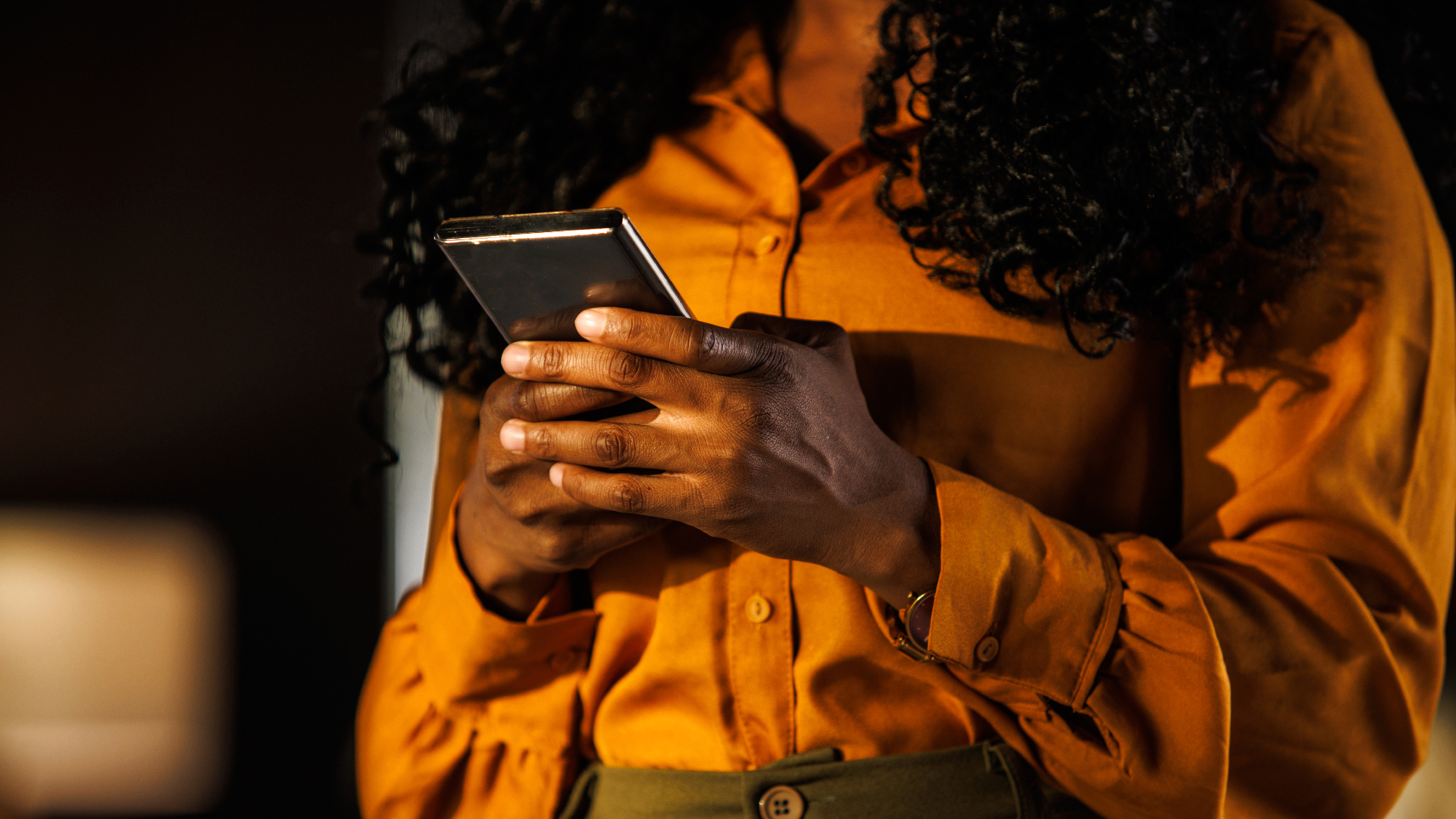Is Kamala Harris right to be wary of Bluetooth?
Vice president insists on using wired headphones for security reasons, report claims

A free daily email with the biggest news stories of the day – and the best features from TheWeek.com
You are now subscribed
Your newsletter sign-up was successful
Kamala Harris is “Bluetooth-phobic” and insists on shunning the technology in favour of wired headphones for security reasons, it has emerged.
Three former campaign aides told Politico’s West Wing Playbook that the US vice president “has long felt that Bluetooth headphones are a security risk”, adding that “while a growing number of consumers are going wireless, the vice president is sticking with the classics”.
In her now-infamous “we did it, Joe” election day video, the VP, who was in the middle of a run at the time, can be seen holding a tangle of white headphone wires in her left hand.
The Week
Escape your echo chamber. Get the facts behind the news, plus analysis from multiple perspectives.

Sign up for The Week's Free Newsletters
From our morning news briefing to a weekly Good News Newsletter, get the best of The Week delivered directly to your inbox.
From our morning news briefing to a weekly Good News Newsletter, get the best of The Week delivered directly to your inbox.
This technical wariness dates back a few years. An aide working on her 2016 Senate bid told Politico that Harris “often preferred texting to email for security reasons”, while another said that she refused to let people wait in her office alone when she was attorney general of California.
Seemingly unimpressed by Harris’s vigilance, the news site questioned whether someone “who travels with the nuclear football” should be “spending time untangling her headphone wires”. So is Harris unduly paranoid, or does Bluetooth carry real security risks?
‘Serially insecure’
It certainly does, according to writer and developer KG Orphanides on Wired. Bluetooth, a type of radio technology, is “serially insecure”, with issues ranging from “low-grade privacy risks to major security breaches”.
A free daily email with the biggest news stories of the day – and the best features from TheWeek.com
One major vulnerability is the fact that you can pair to a device if it is on and you’re in close range, which is usually within about ten metres. If you’re doing something “particularly sensitive involving Bluetooth”, Orphanides said, “you should be aware of your surroundings for more than just over-the-shoulder password snoopers”.
In July, the US National Security Agency (NSA) released a cybersecurity guidance document focused on securing wireless devices in public settings. “In addition to WiFi, cyber actors can compromise other common wireless technologies, such as Bluetooth”, it read.
According to the NSA, keeping a device’s Bluetooth on in a public setting “can pose a cybersecurity risk”. Potential hackers “can scan for active Bluetooth signals, potentially giving them access to information about the targeted device” and then “leverage that information to compromise the device”, the agency explained.
Bluejacking, bluesnarfing and bluebugging
The NSA said that various techniques exist to send, collect or manipulate data and services on a device using Bluetooth.
These techniques include bluejacking (defined by The Guardian as “a technical trick whereby one Bluetooth device sends an unsolicited message to another”), bluesnarfing (where hackers access and steal information stored in a device such as contacts, emails and photos), and bluebugging (when an attacker takes full control of a device).
In 2017, another form of Bluetooth vulnerability – known as BlueBorne – was uncovered by the internet security firm Armis. According to The New York Times, BlueBorne exposed “billions of connected devices”, from Amazon’s Echo smart speakers to cars with Bluetooth, to the possibility of being hijacked by hackers.
‘Needn’t be a massive concern’
So what can one do to keep their Bluetooth-compatible devices safe from cyber-attacks?
There are a few simple steps recommended by the NSA, including monitoring Bluetooth connections “by periodically checking what devices are currently connected to the device”, not using Bluetooth to communicate passwords or sensitive data, and disabling Bluetooth when not in use.
It’s important to remember that for most people, Bluetooth security “needn’t be a massive concern”, said Newsweek. But it does “make sense for somebody in Harris’ position to be extra vigilant”.
Byron Tau, a journalist at The Wall Street Journal, agreed. “Bluetooth peripherals are a security risk,” he wrote on Twitter. “If there are flaws in the security, they can be compromised. Most people don’t have to worry about these things but high level federal officials should.”
Kate Samuelson is The Week's former newsletter editor. She was also a regular guest on award-winning podcast The Week Unwrapped. Kate's career as a journalist began on the MailOnline graduate training scheme, which involved stints as a reporter at the South West News Service's office in Cambridge and the Liverpool Echo. She moved from MailOnline to Time magazine's satellite office in London, where she covered current affairs and culture for both the print mag and website. Before joining The Week, Kate worked at ActionAid UK, where she led the planning and delivery of all content gathering trips, from Bangladesh to Brazil. She is passionate about women's rights and using her skills as a journalist to highlight underrepresented communities. Alongside her staff roles, Kate has written for various magazines and newspapers including Stylist, Metro.co.uk, The Guardian and the i news site. She is also the founder and editor of Cheapskate London, an award-winning weekly newsletter that curates the best free events with the aim of making the capital more accessible.
-
 The environmental cost of GLP-1s
The environmental cost of GLP-1sThe explainer Producing the drugs is a dirty process
-
 Nuuk becomes ground zero for Greenland’s diplomatic straits
Nuuk becomes ground zero for Greenland’s diplomatic straitsIN THE SPOTLIGHT A flurry of new consular activity in the remote Danish protectorate shows how important Greenland has become to Europeans’ anxiety about American imperialism
-
 ‘This is something that happens all too often’
‘This is something that happens all too often’Instant Opinion Opinion, comment and editorials of the day
-
 Fake AI job seekers are flooding US companies
Fake AI job seekers are flooding US companiesIn the Spotlight It's getting harder for hiring managers to screen out bogus AI-generated applicants
-
 Racist texts tell Black people in US to prepare for slavery
Racist texts tell Black people in US to prepare for slaverySpeed Read Recipients in at least a dozen states have been told to prepare to 'pick cotton' on slave plantations
-
 Social media ban: will Australia's new age-based rules actually work?
Social media ban: will Australia's new age-based rules actually work?Talking Point PM Anthony Albanese's world-first proposal would bar children under 16 even if they have parental consent, but experts warn that plan would be ineffective and potentially exacerbate dangers
-
 The Internet Archive is under attack
The Internet Archive is under attackUnder the Radar The non-profit behind open access digital library was hit with both a data breach and a stream of DDoS attacks in one week
-
 23andMe: will customers' DNA go up for sale?
23andMe: will customers' DNA go up for sale?Under The Radar Genetic testing company's financial woes creates concerns around personal data it holds
-
 Why Captchas are getting harder to solve
Why Captchas are getting harder to solveUnder The Radar If the process continues to get harder, it could cause problems for people trying to book tickets for popular shows
-
 Data breaches increased in 2023 and with them, internet security concerns
Data breaches increased in 2023 and with them, internet security concernsThe Explainer One report found a 78% year-to-year increase in breaches from 2022 to 2023
-
 The AI Safety Summit: UK's bid to help world avoid apocalypse
The AI Safety Summit: UK's bid to help world avoid apocalypseThe Explainer Rishi Sunak hopes to become key broker in AI regulation and governance, but may struggle to align US, Chinese and EU interests